Inside The War
Local journalist readjusts after year in Iraq
Story and photos by Cali Bagby
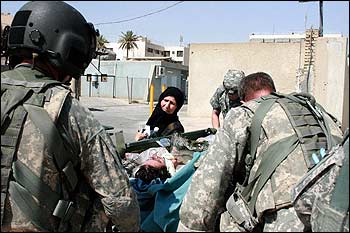 |
| Oregon medevac soldiers help transport a young Iraqi girl, who had recently been pregnant, suffering from severe burns. Her mother accompanies the girl to a hospital in Baghdad, Iraq. The medics believe it is unlikely that the girl will survive. |
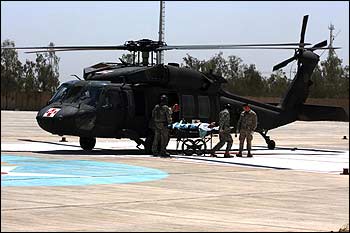 |
| Soldiers from the Oregon Medevac and volunteer soldiers from the nearby hospital unload a patient from a UH-60 Black Hawk in Balad, Iraq. |
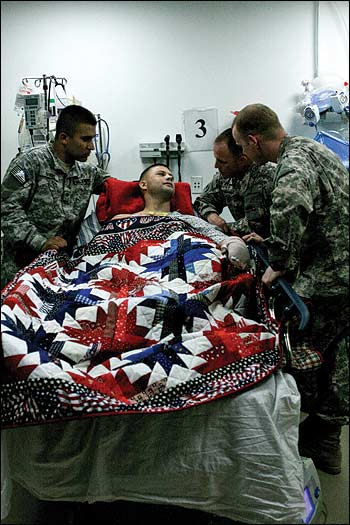 |
| Spc. Jeremy Pierce, wounded by an IED, is surrounded by his fellow soldiers at Balad Theater Hospital in Balad, Iraq. |
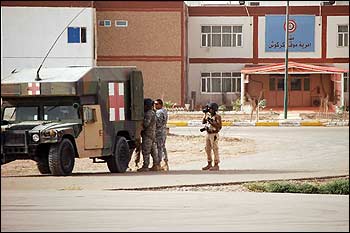 |
| Cali Bagby documents medic Sgt. Mike Barber as he cares for a litter patient on a medevac mission headed to Balad, Iraq. |
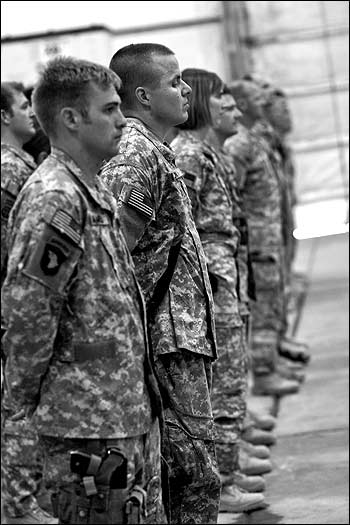 |
| Medevac soldiers stand in formation during a ceremony in Balad, Iraq. |
A hot flash of panic washes over me.
I am white-knuckled, teeth-clenched, heart thumping and alone. “I don’t want to die out here,” I think.
Then the semi-truck’s wave clears and I can see out of my windshield again. The truck speeds into the distance of the dark, rainy night. I am more terrified right now than I have been in the last 10 months, which sounds funny because I just spent the last 10 months in Iraq. Ironically, after flying on UH-60 Black Hawks over Baghdad, riding in armored vehicles across the desert and feeling the shudder of a mortar launched into our base, it’s driving the freeways from Spokane to Eugene that I find the most disturbing.
Leaving and Returning
This time last year I packed my bags and boarded a flight to a military base in Balad, Iraq, where I worked as an embedded journalist with an Oregon National Guard medevac unit and an infantry unit. The medevac unit is responsible for the emergency medical evacuation of the sick, injured or wounded. This unit evacuated patients ranging from Iraqi civilians to U.S. military personnel to military working dogs via UH-60 Black Hawk during their tour in Iraq.
I had graduated from the UO that spring with a degree in journalism. Within months I received a phone call from the commander of the unit asking me to try my hand at war journalism with his soldiers. After several months of deliberation, I made a choice. I had high hopes of starting my career and bridging the gap between Oregon citizen-soldiers and the community left behind.
I spent the year in lonely, desolate military bases, which soldiers refer to as prisons. Iraq is a place of camo uniforms, weapons, ID checkpoints, thundering generators and unhappiness. Sometimes I woke up, stared at the dusty ceiling and groaned, “Not this place again.”
At some point I stopped thinking about the comforts of home. I forgot that anything but Iraq existed. I began feeling less and therefore wanting less and needing less. The days passed like time travel, but instead of going forward or back, I remained stuck reliving the same day every day.
The infantry rolled out on convoys in the darkness over the same monotonous terrain, or they guarded towers for hours on end staring into the flat, quiet desert. The medevac, restricted to less than a mile of space for days just in case they received a mission, ate, worked out, checked emails and watched movies. On busy days they transported patients ranging in injuries from soldiers with broken fingers to Iraqi girls with gruesome burns.
The problem is that one day, January 16, I boarded a plane and set foot on U.S. soil again. Wrapped in the foreign yet warm embraces of my family, I remembered the world that went on without me. It’s the little things that surprise me, like the kindness of customer service, people drinking tap water, having your feet clear of athlete’s foot — persistent in hot climates — or taking a shower without flip flops, or taking a bath.
One soldier, just finishing his sixth deployment, said his favorite thing after a trip away is taking a bath and watching how filth creates a ring around the tub. “All this dirt comes out of your pores from a year in the desert,” he said, laughing. “It’s gross.” All of a sudden there are new milestones, like driving my car, riding my bike, eating my first fine meal and having a drink at a bar. Then, there is the shock of having the same experiences I thought I left behind in Iraq.
The Aftermath
Perhaps sushi was on my mind constantly for the last year because it represented something that was completely out of reach. On my second day back, my parents treated me to a wonderful sushi dinner. It was delicious, but somehow I kept thinking to myself, “This is what I have been waiting for, white rice and cold fish?” — just one of many things I put on a pedestal. Nothing could compare to the daydreams I had during the deployment. The air here should always be cool, crisp, with a constant stream of gentle sunlight, beer should be goosebump rendering, and sleeping on a full sized bed with a comfy mattress should induce 10 hours of uninterrupted sleep. Somehow these things were lost to me. Iraq felt like a lost limb: Though it had been rotted with gangrene, I wanted to keep it in some insane hope that it would heal itself.
Other things are easier to appreciate. There is nothing like sitting on a toilet seat and knowing that you are only one of three people to sit on that seat that day. I hate to complain about port-a-potties because on infrequent trips they are tolerable, and in the U.S. they are even clean, but even using them once in a while in Iraq caused me to loathe their very sight. There are just some things you shouldn’t see, as when temperatures reach 120 degrees outside and when, well, let’s just say the cup overflows.
So you can understand the horror I felt when, upon driving to my childhood home, I spied a suspicious object in the front yard. ‘What is that?” I asked. “Oh that’s just a port-a-potty the workers are using,” said my mother nonchalantly.
My parents were having some work done on the house. Certain smells flashed back into my nostrils, and I felt sick. I told this story often in the following days, but only members of the military found it laughable. I don’t think the average American can comprehend a year among port-a-johns.
I grew disappointed again on my return to the land of the free a few days later. My uncle and I decided to celebrate my homecoming by going dancing at a bar in downtown Spokane. To set this up, so you understand my frustration, I’ll paint a picture of my adventures with my press ID.
Once I got to Balad, I was told that I needed to fly to Baghdad to get my press ID. No big deal. It took a few hours, and I had in hand an official “Combined Press Information Center ID.” I was assured this would allow me access to chow halls, bases, transportation and other basic life support needs. I enthusiastically went to the chow hall with my ID, expecting an easy lunch, but the guard took one look at the piece of plastic with my photo and said, “No.”
This was to be the common theme for the year. No, you cannot go to the gym, no, you cannot go to the hospital, and no, you cannot go on the flight line, no, no, no. So every time someone told me no, I had to produce additional paperwork and my passport and spend a good 20 minutes explaining myself. Then I had to wait for a guard supervisor to approve me. Meanwhile I was ushered away from the main line as the guards checked other IDs. Often I would see soldiers I knew; they would just laugh and chuckle that I was being held. “Watch out, she’s a terrorist,” they would often call with glee. Needless to say it was unpleasant task, always singing for my supper, which wasn’t even that tasty. The menu consisted of limp, soggy vegetables and boiled meat.
So on my return to the U.S., I gave a sigh of relief, confident that my driver’s license would be sufficient, but I was wrong. At the bar, the bouncer took one look at my ID and asked for a debit or credit card, which I did not have. He held the card up, squinting at me. Inside I screamed, “You’ve got to be kidding me,” but I just smiled sweetly, gritting my teeth. “Yeah I’m going to need a signature,” he said ushering me to the corner as he let in the other patrons. I felt a dizzy sort of rage and then a wave of hilarity came over me. My uncle and I convinced the bouncer that it was in fact me. He took pity on us and allowed us entrance.
A couple of days after a night out and drinking formerly outlawed beverages (alcohol is prohibited in Iraq on military bases), I took on my next challenge. Getting behind the wheel after a long absence made me nervous.
In Iraq, I threw up my hands and said, “I have no control over what happens.” Besides, many of the soldiers had witnessed more traumatic experiences on deployments during the invasion of Iraq and Afghanistan, so they remained calm when the helicopters were under fire, if a storm came in or if mortars were lobbed into the base six times in one morning. In my car, faced with having total control over the large machine, I felt panicked on the windy roads, shadowed with huge pines that were once familiar sights.
At first the mortars seemed dangerous, but after a few weeks, I just turned over and went back to sleep if I heard the alarm bell. I figured that I’d get blown up or not. Aside from the mortars, the base stayed fairly quiet. My anxiety focused more on finding a good story than losing my life. Iraq produced a constant sensation that at anytime something catastrophic could occur. Everyone felt on edge, always in anticipation of a worst-case scenario. As a journalist I always looked over my back, always wondered if my actions or words would get me in trouble or kicked out of the country.
Now back in Eugene I walk down the street, nervously putting in my earphones, which are strictly prohibited in any outdoor area in a military base. Will I be chastised for listening to music or for not wearing the appropriate clothing? I have to laugh at myself because if I take a good look around, absolutely no one cares what I am doing. I am no longer one of the only female civilians for miles. I am no longer the only journalist in the city, and this should set my nerves at ease.
I feel anxious crossing the street, bombarded by the chatter of happy people, the bright clothing, the looming trees with great green leaves and the air that is so fresh I feel my lungs expanding to their breaking point. It scares me to think too much about how I feel because if I am not happy at home, I fear I’ll never be happy anywhere. But this is the price I pay for now, the price of enduring a deployment, and at least I can say to any solider who has served in the hellhole that is Iraq: I understand.
A soldier’s work is never done
For now I have little desire to spend much time with soldiers, except a select few. Living with people on a base is like being trapped on an island. But I can’t help peek at a few soldiers’ readjustment phases via Facebook profiles.
I read that soldiers are working on other jobs like fixing the kitchen sink or fixing electrical outlets, unfinished tasks left behind. Most soldiers will take the next month or so off, bonding with the children they have just met, rekindling a romance with a spouse or taking relaxing trips.
Unemployed soldiers will look for civilian jobs in the dismal economy. One soldier with a teaching degree fears the best job he’ll find is at Costco. It reminds me of a young man working at Kinko’s whom I met a few months before I went to Iraq. I spent Halloween night printing off photos. Beside me a couple reeking of whiskey had managed to jam something on their machine and were adamant about getting their $1.50 back. The young man patiently explained that they could not get a refund. The conversation continued; the man stayed polite but assertive. After they left, I heard him telling another customer that he had just come back from a tour in Iraq. That Kinko’s guy had probably been a truck commander or a gunner, like many young men out there. Now instead of fighting in an armed vehicle, he fought with people over less than two dollars.
In the end, there is no real bridge between the military and the civilian world because war exists only outside America’s walls in a form that most of us cannot touch. War remains a distant image only transferred through gray photos in a newspaper or bright flashes on a television screen.
Cali Bagby is a former intern at EW. Her earlier stories can be found by searching for her name in the EW web archives.